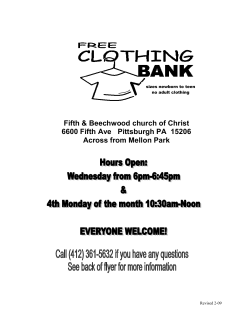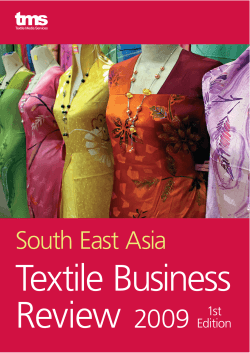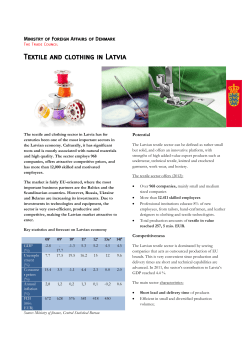
f a c t s h e e... Used Textiles: A Valuable Resource
f a c t s h e e t Used Textiles: A Valuable Resource Every year Massachusetts residents and businesses throw away about 230,000 tons of usable textiles, including clothing, footwear, belts, hats, handbags, throw rugs, 1 drapes, towels, sheets and other linens. Ninety-five percent of this material can be reused as clothing, converted to wiping cloths, or recycled into new fiber-based products. An Economic Resource: Massachusetts is home to more than 25 businesses, manufacturers and non-profit organizations that sort, reuse, “upcycle” or convert used textiles into new products Dozens more businesses are involved in the resale of clothing, locally and overseas, which in turn supports cottage industries in developing nations. Donating used textiles supports local charitable organizations that provide jobs and job training to Massachusetts residents. Donated textiles provide low-cost quality clothing and household linens to residents with a limited budget. Keeping used textiles out of the trash reduces disposal costs for local government, businesses and residents. Environmental Benefits: Textile recycling decreases the amount of trash we bury in landfills or burn in municipal waste combustors Cotton is the most pesticide-dependent crop in the world. It takes 1/3 of a pound 2 of pesticides to make one t-shirt. Production of synthetic (petroleum-based) fibers like polyester and nylon produce volatile organic compounds, nitrous oxide (a greenhouse gas) and consumer large 3 amounts of water. Donate, don’t judge …. Contrary to popular belief, donations in any condition are welcomed by for-profit and non-profit textile collectors alike. This includes items with stains, rips, missing buttons or broken zippers. Why? Textiles are a valuable commodity! Items that don’t sell in a thrift store are baled and sold to brokers or graders who sell to overseas markets. In developing nations, used clothing and textiles supply local enterprises with materials to repair and resell. The only UNACCEPTABLE donations are: wet/moldy items items contaminated with oil or hazardous substances. What to donate: Clothing: Shirts, pants, jackets, suits, hats, belts, ties, gloves, scarves, socks (even single ones) undergarments, handbags, backpacks in any style, age or condition. Footwear: Shoes, sandals, sneakers, cleats, boots, flip-flops, and slippers Household textiles (even stained and torn items): Curtains, drapes, sheets, blankets, comforters, towels, table linens, throw rugs, pillows, stuffed dolls and animals 1 Based on data from Municipal Waste Combustor Class II Recycling Program Waste Characterization Studies, February & March 2011, available at http://www.mass.gov/eea/agencies/massdep/recycle/reports/waste-reduction-and-recycling.html 2 3 Secondary Materials and Recycled Textiles Assn: http://www.smartasn.org/consumers/index.cfm# Secondary Materials and Recycled Textiles Assn: http://www.smartasn.org/consumers/index.cfm# Textile Recovery: What You Need to Know Page 1 of 2 What Happens to My Donated Textiles? Massachusetts Department of About 45% of donated textiles are sold as second hand apparel, either through charitable organizations or for-profit exporters that sell baled clothing to developing countries. Organizations such as Goodwill and Salvation Army operate retail stores where donated clothing and household items are sold. Clothing and textiles that don’t sell in the stores are baled and sold to textile brokers. Both activities generate revenue to support their core missions. For profit textile recyclers sort, grade and bale textiles and sell them to export markets. Clothing exports from North America supply high quality product to local entrepreneurs who in Africa, where 95% of the population wears used clothing. Another 30% is turned into industrial wiping cloths. ERC Wiping Products (Lynn, MA) cuts used clothing and other textiles into rags and sells them to commercial garages and public works operations. The remaining 20% is sent to fiber converters like Millbury Textile Recycling (Millbury, MA) where textiles are broken down into their basic fiber components to be re-manufactured into insulation for autos and homes, carpet padding or soundproofing materials. Companies like Boston-based Project Repat make custom quilts and blankets out of old t-shirts. These “upcycled” products are sewn at factories in Woburn, Lawrence and New Bedford that pay workers a fair and living wage. Environmental Protection One Winter Street Boston, MA 02108-4746 Commonwealth of Massachusetts Deval L. Patrick, Governor Executive Office of Environmental Affairs Where to Donate: Locate textile recyclers in their area by visiting the following websites or check with your municipal recycling coordinator: SMART (Secondary Materials and Recycled Textiles): www.SMARTasn.org Council for Textile Recycling: http://www.weardonaterecycle.org/index.html Businesses only: Recycling Works (MA): http://www.recyclingworksma.com/listingtype/textiles-fabrics/ For more information: Contact Brooke Nash, Municipal Recycling Branch Chief at (617) 292-5984 or brooke.nash@state.ma.us Richard K. Sullivan Jr., Secretary Department of Environmental Protection Kenneth L. Kimmell, Commissioner Produced by the Bureau of Waste Prevention July 2013 Printed on recycled paper This information is available in alternate format by calling our ADA Coordinator at (617) 574-6872. Textile Recovery: What You Need to Know Page 2 of 2
© Copyright 2025





















